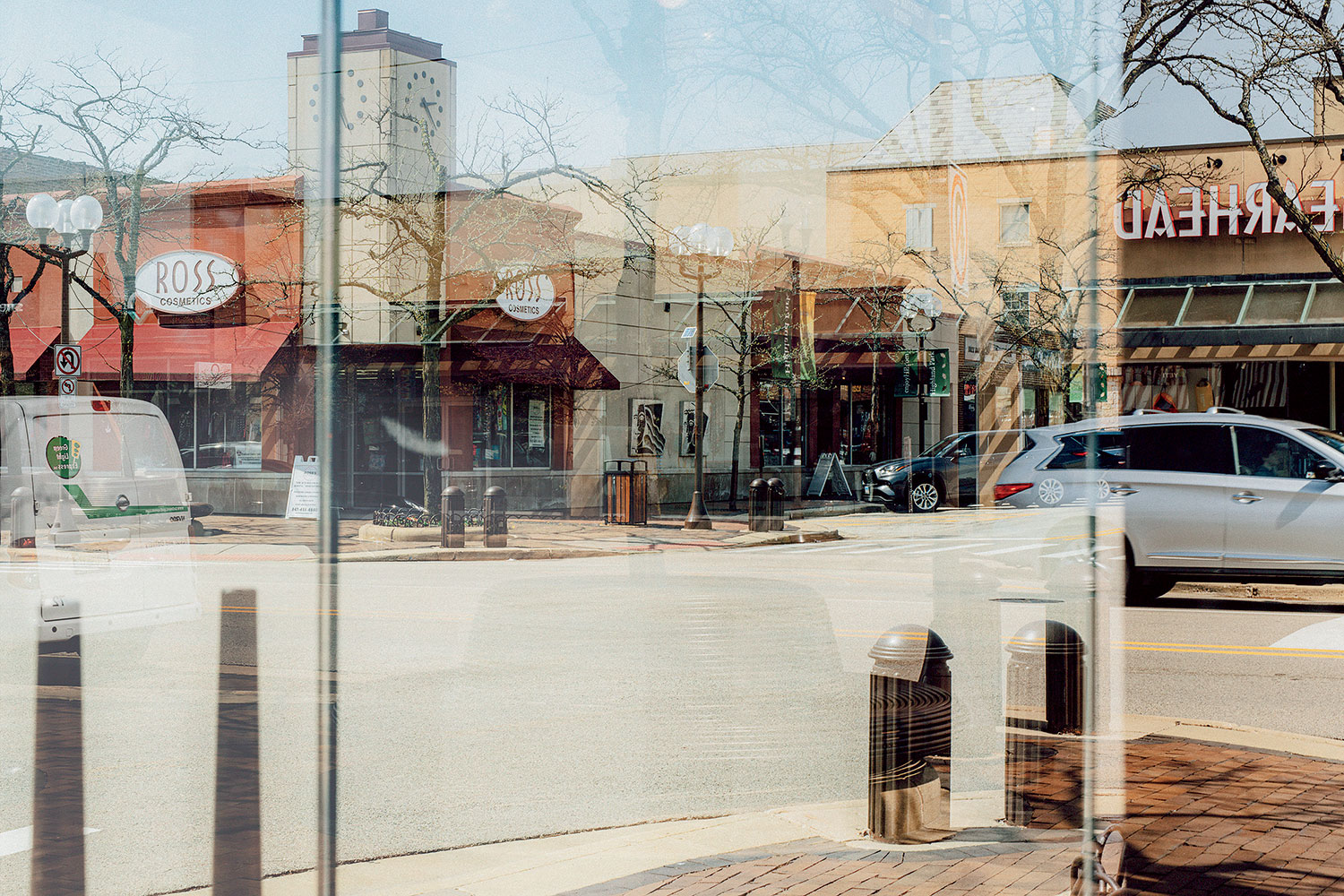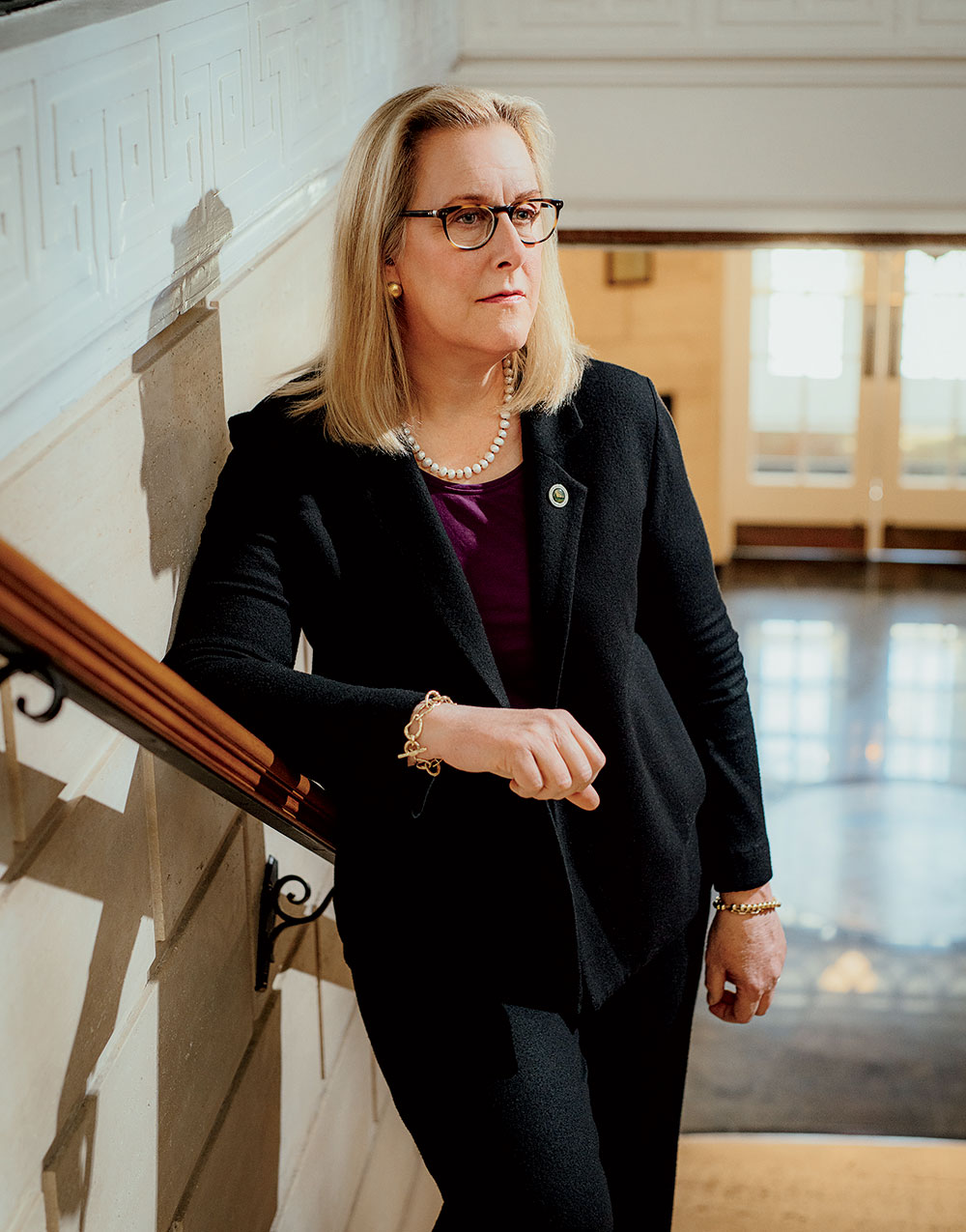
The Mayor
Nancy Rotering
In January of 2020, I was at a United States Conference of Mayors talk about responses to mass shootings. In the middle of it, the mayor of Seattle had to get up and go because there had been a mass shooting in Seattle. It’s a fear all mayors have — that the devastation of something like this will land in their front yard.
For us, it did last Fourth of July. We had started the parade at 10 right outside City Hall. We had walked four blocks to Green Bay Road and started down the hill on Central Avenue, with the high school marching band following us, when I turned to my council colleagues and said, “I wonder why the band stopped playing.” All I could hear was a drum cadence that was too fast for people marching. What I didn’t realize until somebody played me a video later was that I was hearing shooting. Then I saw a sea of band members in blue shirts and khaki pants racing down the sidewalk. The tuba players were running with their tubas. I couldn’t figure out why.
About 10 seconds later, a fire engine started whirring straight up the parade route at us. I thought, “Oh my gosh, somebody must be having a heart attack.” Simultaneously, I got a call from my husband — a council member’s wife had called him — and a call from the city manager: “There’s an active shooter. Somebody’s been killed outside of Gearhead.” I just thought, “What am I hearing?” And then: “Oh, not us. Not now. Not today.” Just that sinking feeling of “It’s our turn.”
The City Council immediately split into two. One council member ran up the hill to check on his spouse. Our city manager also ran up the hill to help the paramedics put pressure on the wounds of those who had been shot. The rest of us went to the sides of the street and yelled to people to run: “There’s an active shooter. Go that way. Just go, go, go, go, go. Leave your stuff.” We were unbelievably calm. Several of us were like, “Should we have run up the hill?” But by getting people out of the middle of this chaotic, violent scene, I think we were able to do our small part.
Later, I went to the emergency operations center we created at the main fire station. That was an unbelievable scene of all these agencies — FBI, ATF, Lake County Major Crimes. Hundreds of people. I’ve never seen so many people in such a small place, and they were phenomenally organized. Everybody knew their role. I was just like, “OK, keep me in the loop of what’s happening.” It wasn’t my place to start interfering in the middle of an active investigation.
In the midst of all this, I was getting calls and texts from people. One text had a picture and said, “Do you know who’s missing this toddler? We’re hiding in the underground garage at Port Clinton Square and we don’t know whose child this is.” He had blood on him. And then realizing as we called all the emergency rooms that nobody was looking for a missing child — it’s a horrible sinking feeling. It turned out to be Aiden McCarthy. Both of his parents had been killed. Then someone called me and said, “We’re looking for Katie Goldstein. Has she gone to the emergency room?” She was also one of the deceased. And I was hearing from people who had been hiding for over six hours: “When can we come out?”
I went to all of the funerals, except for Kevin McCarthy’s. His family specifically said they didn’t want political people who didn’t know Kevin, and I was like, “I understand.” All the funerals were within days of each other — three were on one day. At Stephen Straus’s funeral, his grandson Toby said he had found a postcard on his grandfather’s desk with the World War I poem “In Flanders Fields.” He read it and said, “My grandfather died in combat.” In essence, he did.
When I testified before the U.S. Senate Committee on the Judiciary, I talked with great detail about what happened to several of the deceased, how they died. But to have somebody like Ted Cruz look at me and go, “Yeah, but Chicago and handguns …” It’s like, “Ted, listen to my words.” And the disrespect — the fact that Josh Hawley left before I and the other panelists spoke — it tells me that we have a long road ahead of us in banning these assault weapons from our country.
“I was hearing from people who had been hiding for over six hours: ‘When can we come out?’ ”
I’ve spoken with people in the White House, and we’ve agreed this is sort of the Emmett Till moment in the world of mass shootings, for lack of a better analogy. Let’s talk about not just “That was terrible for your community,” but how it’s terrible for the people who are still in and out of the hospital because of what some person decided to randomly do to them the day they were celebrating with their neighbors. Let’s talk about the fact that there are people still working through deep PTSD. One person told me in detail what they had done to try to save their relative. The entry of the bullet was as big as your thumb, but the exit was as big as your fist. People need to hear these stories.
This Fourth of July, we’re starting with a ceremony in the rose garden by City Hall, where we have a temporary memorial. And we’ll have a moment of silence at 10:14 a.m. From there, we’ll retrace the parade route and reclaim it together as a community. And that’s how we will start to come back together on a day of remembrance.
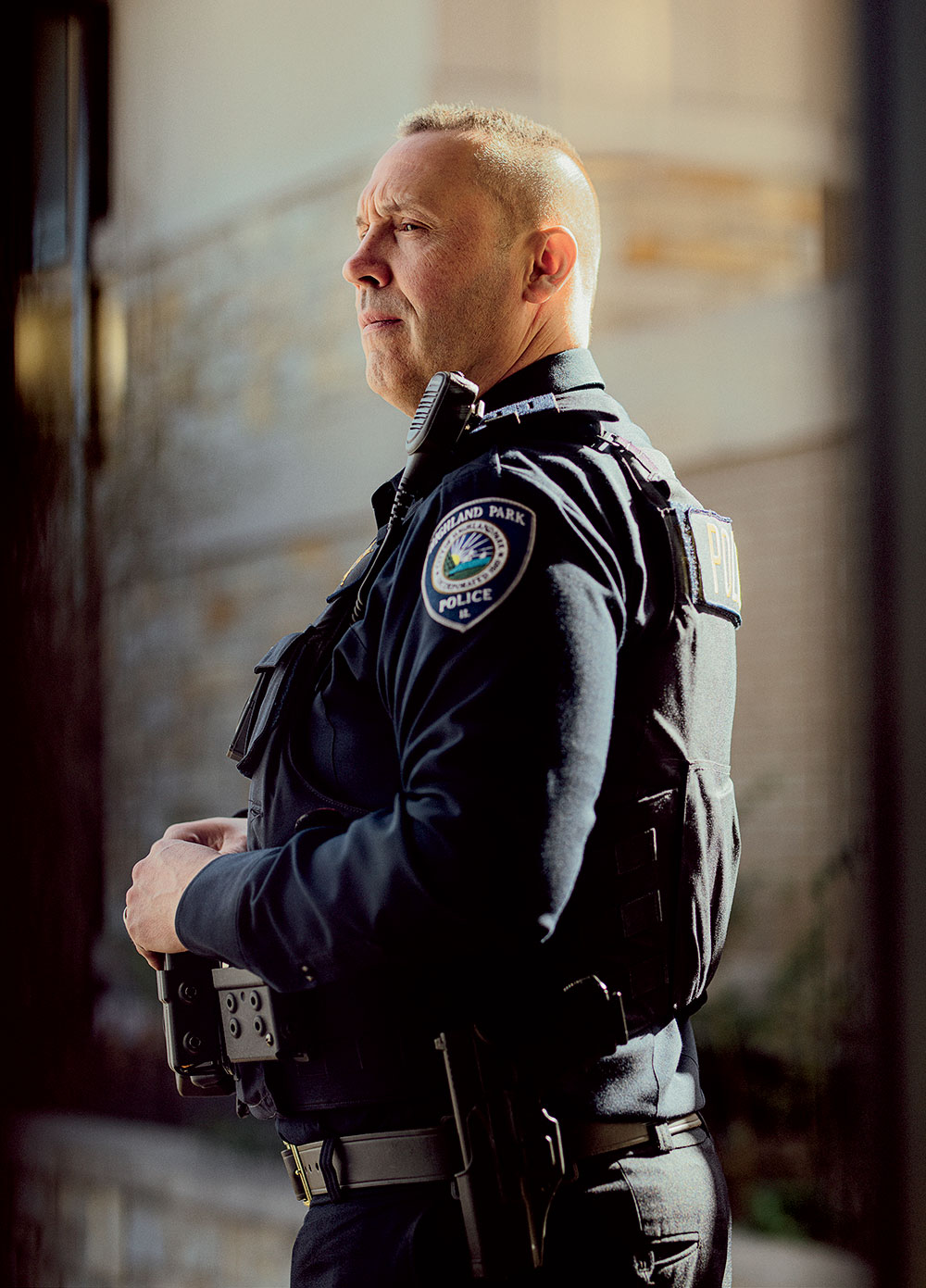
The Police Chief
Lou Jogmen
It started out a beautiful morning. We hadn’t had a parade for a while because of COVID, so it was so nice to see people I hadn’t seen in person in a while. The police department had started a summer baseball card program to try to reengage with kids, so the other officers and I were handing out cards along the parade route.
I was near the train tracks at Laurel Avenue, about a block out, when I heard what I thought were gunshots. We fire assault rifles, so the sound was very familiar. That drew my concern. I got on the radio and in short order confirmed that’s what it was.
As I approached Port Clinton Square on my way to the scene, people were coming towards me, bloodied and screaming. When I rounded the corner, I could see people who were hit and down and officers running towards the sound, trying to identify where the suspect was. The shots had stopped at that point, but we didn’t know if he was reloading. Sometimes shooters allow first responders to get there and then reinitiate their attack.
I put a tourniquet on somebody who had a pretty grievous leg wound and moved on. The only way I can describe the damage that assault rifles do, without going into graphic detail, is that the worst wounds are inconsistent with life. Running through the scene, I saw a number of such victims — it was evident there was not much we could do for them.
Almost to a person, the other officers had self-deployed. They had left their families to come and help. We had a core group there who managed to get a grip on things. We did whatever we could to get people medical treatment. Some officers and one of our commanders threw people into their cars and made three trips back and forth to the hospital. Everybody was pitching in. We were working shoulder to shoulder with fire departments, people from our Community Emergency Response Team, and other citizens who stopped by to help. The shooter still could have been out there, but that didn’t dissuade them from helping people they didn’t know. That gives you a lot of hope for the human race.
“To this day, we’re still talking with folks who were involved, who were injured and are scared.”
After the victims were all transported, we made our way to the emergency operations center at the fire station to start coordinating a search for the suspect. The situation was rapidly evolving, and in these types of things there’s the fog of war — you get a lot of chaotic information early on and misinformation. You’re hearing from different people that the shooter was up top or down low, because the sounds were bouncing off buildings, and we got all kinds of different descriptions of the suspect.
Once we were able to take the suspect into custody, that was the first step in the longer process of seeking appropriate justice. But suffice it to say, that first step was monumental. People who have gone through something like this deserve to have at least that level of closure.
I’m proud of the work our team did, but it’s an uncomfortable pride because you know that people lost their lives. We’re still working through a lot of issues. To this day, we’re still talking with folks who were involved, who were injured and are scared. I’m hopeful it’s cathartic for them. I know it is for my officers, because it’s a hard thing to go through. But we all pulled together that day as a community, and there’s a lot to be said for that.
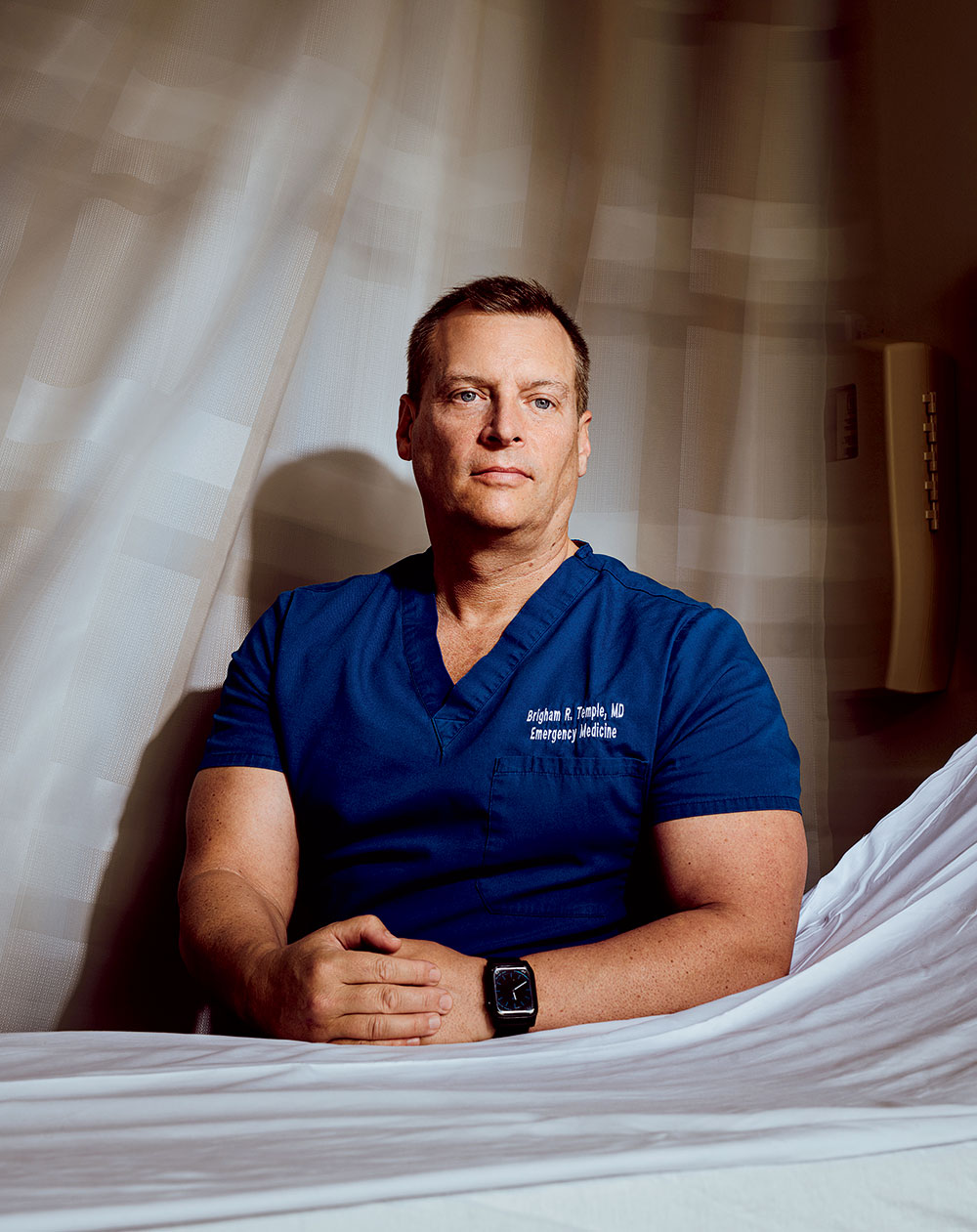
The ER Doctor
Brigham Temple
As medical director of emergency preparedness at NorthShore University HealthSystem, I’ve been putting plans in place for disasters since 2005. Every year we do a hazard vulnerability analysis to gauge our risk areas, everything from a cyberattack to a severe weather event. A mass shooting has always been in our top 10.
I was at the parade, two blocks from the shooting. My wife and our three teenage boys were with me, along with my parents, who were visiting from Utah. We were on Central, just west of Green Bay, where the parade comes down the hill. We’d already seen the fire trucks go by, some police, and people on bicycles. Then, all of a sudden, we started seeing teenagers from the band running down the street towards us. People don’t run in that way unless they’re late or afraid.
My first thought was: “Let’s get you guys out of the area.” So I took my family to our cars, and while we were driving home, I started getting pages that let me know our emergency department at Highland Park Hospital was going into lockdown. We do that when patients come in after some type of violent crime. As soon as I knew that, I started putting the pieces together.
“I had never seen an AR-style rifle wound before. These are military-grade rifles used to kill. They produce massive injuries.”
From home, I made it to the hospital in under 10 minutes, using every back road possible. When I got there, paramedics had already shown up with two patients, and more were coming. Not everyone was transported to Highland Park Hospital that day, but the majority were. Within about 30 minutes, we had close to 20 physicians and 20 nurses show up. Some came from other areas in the hospital to make sure we had enough staff.
I had assigned myself to a couple of rooms until we got enough physicians. I saw the mother of the young boy who was shot. She had a wound to the ankle and leg. The boy was wounded in the abdomen and had injuries to his aorta and esophagus. The likelihood of somebody surviving injuries like that from a high-powered weapon is infinitesimally low. He is alive because of the work of two trauma surgeons, an anesthesiologist, the nursing staff, and the emergency physician that helped do some of the initial evaluation.
When I worked at Northwestern Memorial Hospital in the city, and even when I worked in Elgin, I saw some gang-related stuff where there were maybe two or three victims. But never 25. And I had never seen an AR-style rifle wound before. These are military-grade rifles used to kill. They produce massive injuries. Even in the extremities, it’s very large bullet holes and a lot of soft tissue damage. And anybody who gets shot in the critical areas — head, chest, abdomen — is likely not going to survive.
I have a switch. I switch into the mode of “I’m here to help people and provide a service.” I’m weird that way. But for the vast majority of people involved that day, there’s a huge emotional component. There were a number of physicians and some of the nursing staff who were quite affected. We made sure they got the opportunity to decompress, take some time off, and talk to folks that work in mental health. Those wounds take a long time to heal. And sometimes they never do.
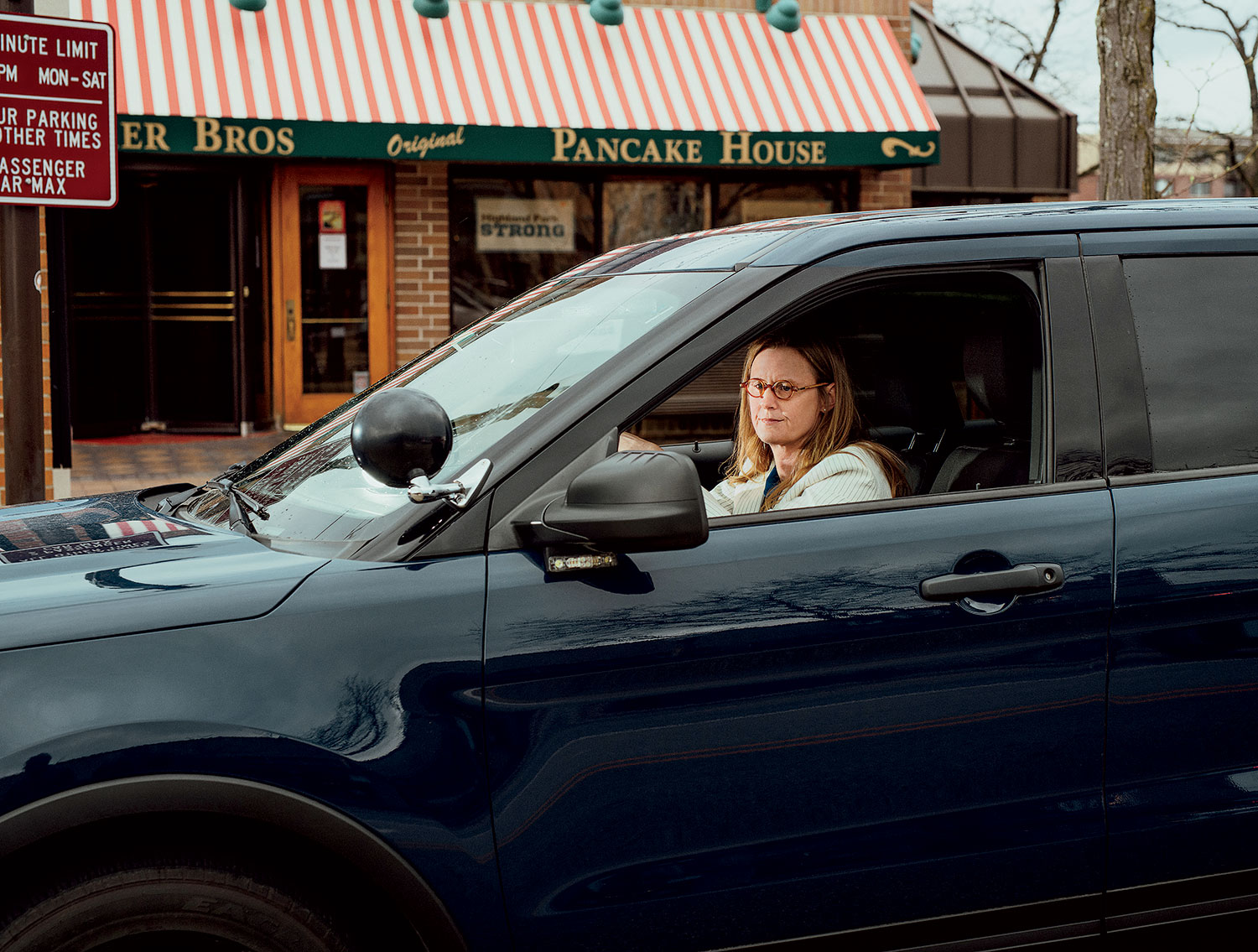
The Coroner
Jennifer Banek
There have been terrible cases before here in Lake County. The one that comes to mind for me was a father who killed his daughter and then killed himself. But July Fourth was by far the worst. I had just come home from being in a parade in Vernon Hills when I received a call from my chief deputy, Steve Newton. He had heard there was an active shooter in Highland Park.
I’m a certified registered nurse anesthetist by training, so I work clinically as well. At that moment, as the Lake County coroner, I had to change my way of thinking from first to last responder. By the time I arrived at the scene, a perimeter was set up and the wounded had been transported to Highland Park Hospital. But it was still very much an active situation. I had on Birkenstock sandals, a jean skirt, a tank top, and a bulletproof vest. I was not dressed for the part.
I remember getting out of the car and just looking around. The decedents were covered in blankets. The first one I saw, by Gearhead, his brains were on the sidewalk. The others were on the other side of the street by Walker Bros. These people had no defense and were just trapped. It was a celebration one moment that stopped the next.
Once the bodies were collected and brought back to the coroner’s offices in Waukegan, I stayed at the scene to make sure we had positive identities and coordinated with Highland Park so I could notify the families before we gave out information to the public. Nicolas Toledo’s family was in the back of Gearhead in some changing or inventory room when I talked to them. Family members translated for me. The McCarthys’ case was so unfortunate because the family members had been under the impression that Kevin and Irina were at the hospital.
“I had on Birkenstock sandals, a jean skirt, a tank top, and a bulletproof vest. I was not dressed for the part.”
I was able to get through that and all the calls OK. I am very direct. I think it’s really important to use words like “Your loved one has died. I am so sorry.” But not to give false reassurances. It’s also important to show that I am human. Sometimes people will hear that I’m pausing or speaking slowly, and it’s because I’m feeling emotional myself.
Since the shooter was still at large, a group of us were sitting inside of Walker Bros. for what felt like a couple hours. My family and I go there for breakfast every year after we do the turkey trot in Lake Forest. So the fact that I was there at this tragic moment seemed surreal. The glass was shot out of the revolving door. It felt like you were in a war zone.
It was 11 at night before I went home. I’d left my car lights on and now it was 12 and a half hours later, so my battery was dead. I called down to the Highland Park Police Department and they jumped it.
We did all of the autopsies the following Monday morning because we knew the state’s attorney would want to get their information in order. Each one took maybe two hours. An AR-15-style rifle shreds the body. It’s very difficult to clearly delineate entry and exits because the pathway is not direct. It destroys many organs.
Part of this job is being the voice for Jacki, for Eduardo, for Irina, for Kevin, for Stephen, for Katie, for Nicolas. That’s where I find meaning in the work we do. And there has to be an opportunity in the data we deliver. In these people’s deaths, there has to be an opportunity for positive change.
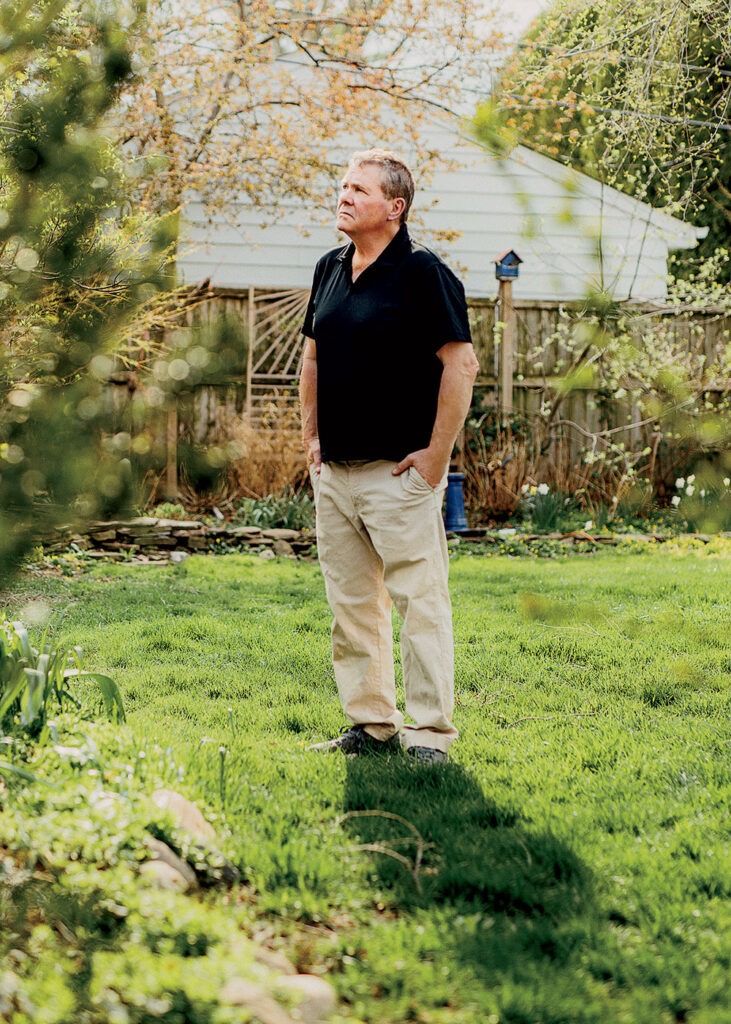
The Widower
Bruce Sundheim
Jacki was such a positive, giving person. She would always make time for everybody. She worked for our temple, so we’d been wrapped up in temple life for 30 years. When we’d go to a restaurant, invariably we couldn’t get through a meal without somebody coming up and saying, “Jacki, how are you?” It used to annoy me. But when you think about it, it’s a large temple, and Jacki was there for basically every life event.
One of the reasons we had such a great marriage is that she was good at all the things I hate, so we complemented each other. Making appointments, maintaining friendships, that kind of stuff — I’m terrible at it. She was the social chairman. I just went along for the ride. I’m trying to find some equalization, to be a bit more like her by doing some of the things she did, but it’s a hard haul for me.
The weird things are the triggers. The first month, it was everything — a song, a TV show. The first time I saw a flag at half-mast, knowing what it was for, I was a hot mess. And I’d be flipping channels and some scene would come on that we’d shared a laugh over, and I’d just fall to pieces. Things that used to bring me joy, like gardening, just seem a little hollow now, frivolous. It’s like your whole system is out of whack.
I was working from home that day and didn’t want to go to the parade. But Jacki was all excited and went. She was already planning on going to the Deerfield parade after. I was at my desk when her sister, Tracy, called. She had been sitting on one side of Jacki. Their cousin and a doctor who was there with his family were working on Jacki. I couldn’t wrap my brain around it at all. “What do you mean, shot? It’s a parade.” And then it was like, “Oh, shit, it’s one of those.”
I got in my car and was driving down Central toward downtown, but police had the road blocked off. So I pulled into the fire station near Beverly Place. That’s when Tracy called again and told me Jacki was dead. My brain just stopped working. I couldn’t figure out a course of action. I ran up to one of the police officers and said, “Hey, I’ve got to get downtown. My wife’s been shot.” He’s like, “Sorry, it’s an active crime scene, that guy’s still out there somewhere. I can’t let you in.” I’m like, “I don’t care. I’ll go in anyway.” But he was adamant. So I never got to see her. And because it was a crime scene, she basically was lying in the street for eight hours.
A fireman drove me to the Highland Park train station. That’s where they were going to have a family reunion area. I was there with some police officers and close friends of ours. And my brother managed to make it. While we were there, the police came with the little boy whose parents were killed. That was rough. One of the people I was with knew that there were grandparents, so they managed to reach out.
I’d been sitting there for two or three hours when the police deemed the train station too close to the active scene. I went home and sat on my screened-in porch for a bit. Then we left for the police station. Almost on cue, all my neighbors gathered and met me at the driveway. Everyone was crying and it was very emotional.
“I’d be flipping channels and some scene would come on that we’d shared a laugh over, and I’d just fall to pieces.”
Later on, the coroner called when she had the body, because she knew I was horrified that Jacki was lying in the street. She said, “Just so you know, she’s with us.” I didn’t want to see Jacki like that, but I mentioned that my daughter, Leah, did. The coroner said, “Not a good idea. Wait till we give her to the funeral home.” So Leah got to see her there. I didn’t go — I preferred not to have my memories scarred by that.
The press was sitting in front of my house for days, but neighbors basically flushed them continuously. And I had messages from every major news organization. I had no interest in talking to anybody.
About five weeks later, I went back to work. I’ve worked for the Chicago Mercantile Exchange since 1984. My nephew also works there, so Jacki’s death was well advertised within my company. It was painful early on, because anytime you walk in, everyone stops and it’s a reception line. That constantly brings it back, so I dreaded that. The company was very supportive. They were basically like, “If it’s too much for you, you can work from home. Whatever you want to do.” But to tell you the truth, getting back to work was helpful. Sitting around the house, there were just too many reminders.
Nobody loved Christmas more than my wife. We’re a muddled household, Jewish and Christian, and we’d have competing shrines — Hanukkah over here, Christmas over there. So the holidays erased the first few months of healing. And my wife’s birthday is in December, two days after Leah’s. So it was a rough, rough month. Everything was a reminder.
I’ve never felt like I was depressed or not mentally well. I was just horribly sad and grieving. And anger was a big part of that. I had anger for everything early on. I was grateful for the police response, but it was like, “How could this have happened?” The first week, I lost faith in everyone, in society. That has eased over time. I still can’t wrap my brain around the idea of waking up one morning and deciding to shoot all those people. It’s incomprehensible to me that someone could have that much hate.
We go to temple services all the time. I find them painful and comforting at the same time. And we have well over a thousand notes from people all over the country — eight to 12 a day the first two months, including from church congregations where every single person wrote a note — and total strangers sending us food. We’re still getting letters, and people are still making donations in Jacki’s name to the Highland Park Community Foundation and to temple charities. So the generosity has really helped with the healing process. It brings you back to an even keel when you see an outpouring of love on such a titanic scale. It’s thought-provoking in the sense that I feel bad for the people who get killed every week in Chicago who aren’t getting condolence calls from strangers.
I’m hoping that maybe once we’re a couple years removed, things will be more normalized. But she’s in my mind all the time.
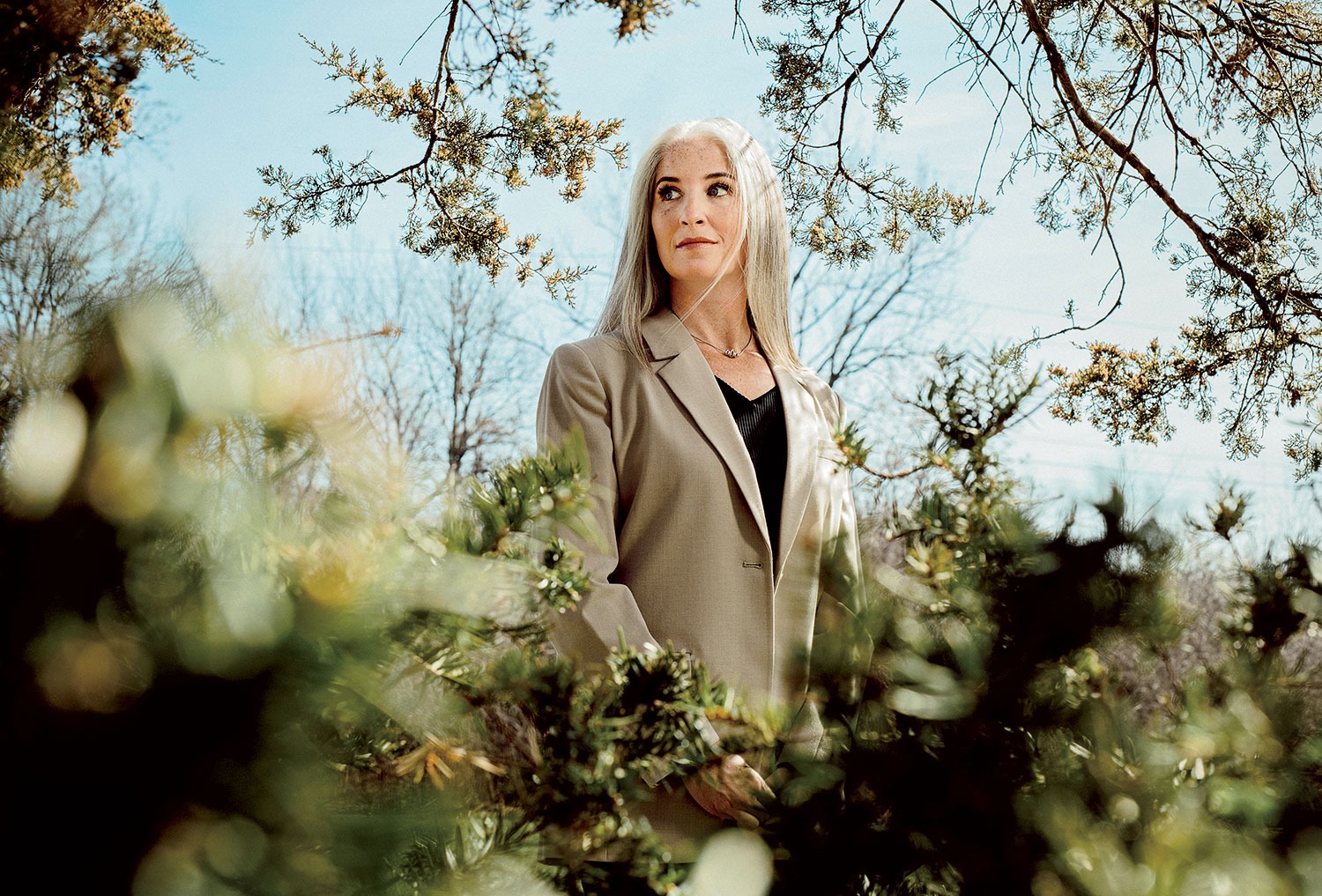
The Survivor
Lauren Bennett
I wanted to walk out of that hospital and have everything go back to normal. I knew it wouldn’t. My body’s not the same. I try to do as much as I did before, but I can’t. My strength isn’t there. And I’m not going to sugarcoat it: I’m scared. The depression, the trauma didn’t kick in until my wounds had closed. It’s like my mind made sure my body had healed first. That was the point where I had to seek therapy. The PTSD manifests when you least expect it. I could be volunteering at my child’s school and just get lost in my thoughts.
That morning, we were sitting along Central with my parents and in-laws. That’s when I saw bullets flying around me. We were kitty-corner from the shooter. The sound is different than in the movies. It’s a much more crisp, direct sound. One of the bullets hit my lower back and came out of my hip. I saw blood. Right then I knew. I screamed, “We’re under attack!” and got up and ran. I got hit again in the back, right behind my heart and lungs. If that had gone through me, I wouldn’t be here today. Once you are shot twice, you think you are the target. So at that point, I was only trying to help myself. My husband grabbed our children. He was holding one son and having the other run in front so my husband could shield him.
I dove in the bushes behind us to get my thoughts together and barricade myself. It’s interesting — the brain kind of goes into slow motion. Although it was only a few minutes, it felt like a good hour. I don’t know if that’s your brain trying to tell you to make smart choices. My clothes were soaked with blood, so I knew I had to find some type of medical help. There weren’t any medics around at that point, so we ran to the car, four blocks away, and piled in, bleeding everywhere. My mother-in-law and my mother were also wounded.
My husband drove like a maniac, over people’s lawns and through red lights and down one-way streets, all while honking his horn and screaming, “Out of the way! We’ve been shot!” He got us to the emergency room before they even knew there was a mass shooting. They looked at us like they couldn’t even believe what I was saying.
I ran to one of the beds and sat myself down. They quickly started running tests on me and hooked me to an IV. I didn’t know anybody who’d ever been shot, so in my mind I was like, “I can’t even call someone and ask, ‘What happens now? Am I going to be OK?’ ” Within the hour, other people started piling in. I was sitting there watching all this chaos, realizing, “Oh, wow, we were part of a mass shooting; we’re part of a statistic.”
“When everything happened that morning, I found inside of me a strength that I didn’t know I had. I wanted to survive.”
I was in the hospital for one night and then came home. I was bedridden for the most part. They didn’t stitch me up because they like to drain the wounds, so there was bleeding for about six weeks — and a lot of pain.
We have a third son, the oldest, who had been away at camp in northern Minnesota. We drove out to see him because we had to show him that Mom was alive. The younger ones — they were 6 and 9 at the time — had a real fear of losing their mom. It was very traumatic for them. They ran for their lives. They saw me running with bullet wounds. They saw dead bodies. They saw things that no little kid should ever have to see. So I push on for them. They deserve a normal childhood, so I’ll make sure that happens. I don’t want them to think that I won’t walk them to school, even if I pay for it that night with a little soreness.
My husband and I live life differently now. We don’t get upset over small stuff. But the things our family used to enjoy, we don’t do as much. In crowded places, you’re always looking over your shoulder, always looking for an exit. I don’t know if a parade will ever make me happy again. I don’t know if I’ll ever watch fireworks again. So we’re navigating, trying to carve out our new normal.
The anger is there, but we’re trying not to tap into it. You can’t live your life like that. I don’t want to be seen as a spiteful person. I need to stay positive. So that part I have not really tried to deal with yet. I don’t know if I ever will.
I’ve never been one to stay at home and sulk, and it would have been easy to fall into that. But I don’t want to be a victim. I don’t want to be treated like you’re mourning me. I’m still here. When everything happened that morning, I found inside of me a strength that I didn’t know I had. I wanted to survive.
I belong now to a very small group of people who have survived not only a mass shooting but being shot by an AR-15 type of semiautomatic weapon. And I believe I lived in order to tell the story. I found a voice, and people want to listen. Advocacy opened a door for me to this whole movement that you’re not aware of until something traumatic happens to you. I do it for myself, but I also do it for my kids. And I do it for your kids. We don’t deserve to live in a world where someone can walk in, shoot up a school, a movie theater, a parade, and innocent people die. So I will fight that fight.



